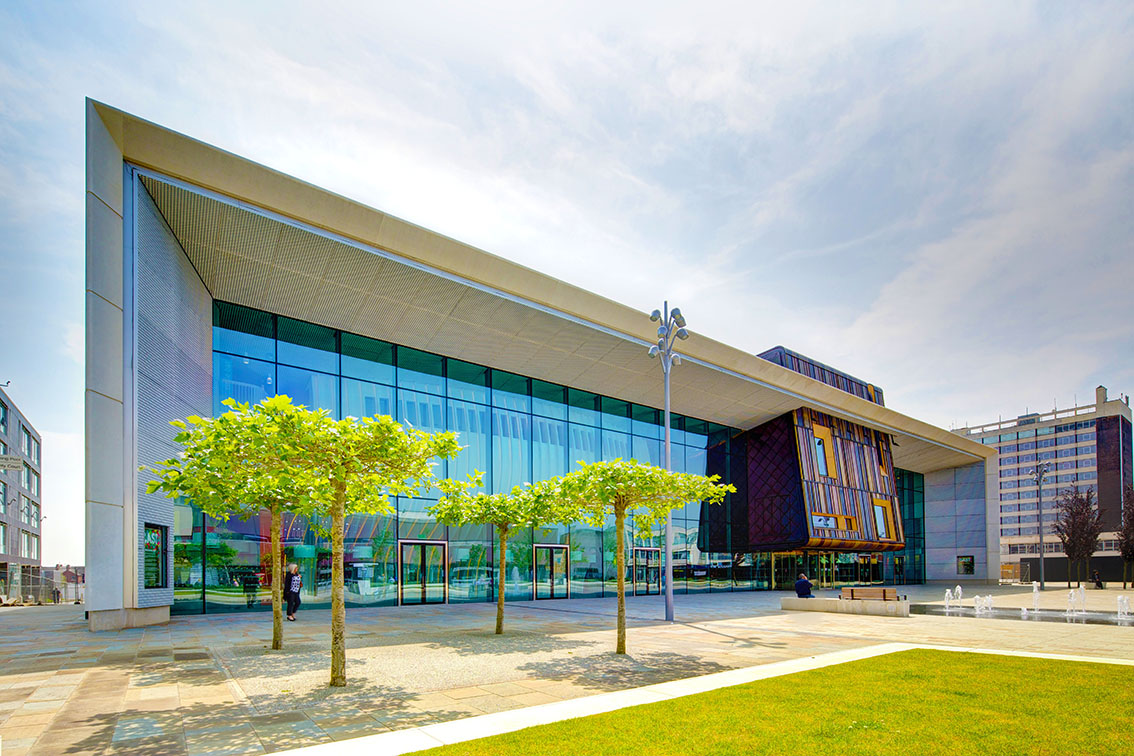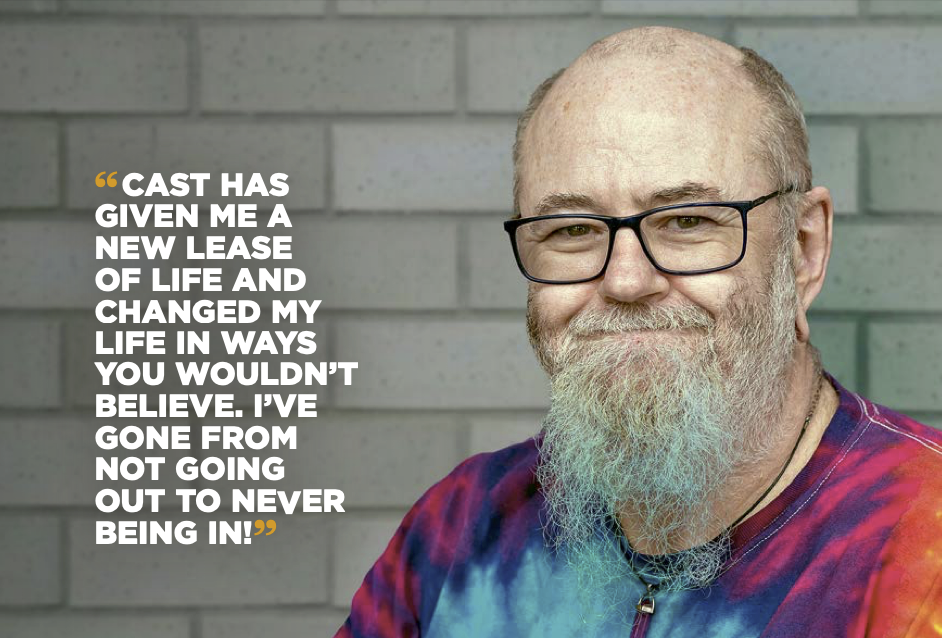For Ady Lithgow, 57, from Doncaster, explains how Cast has changed his life and become a home from home entertainment venue. “It’s my second home. I go there at least twice a month to watch productions and it’s set up so well for people with disabilities. They’ve got disabled spots, or if you want a regular seating area, they take some seats out so you can sit there with a carer.
“It’s amazingly set out. It’s all ramped and the staff can’t do enough to accommodate you. It’s so fantastic to have somewhere that people with disabilities can attend easily and know they can get involved and enjoy it just like anyone else.”
Ady has been diagnosed with multiple health conditions and physical disabilities, which he started to experience symptoms of after a fall at work around 30 years ago. “I was working in a chemical plant in distribution warehousing and I was changing some racking when it snapped and I fell about 30ft on to concrete. I had always been a very fit man before then – I used to be a coal man and would throw around bags of coal quite easily, and I used to go to the gym four times a week – but after that I was in so much pain, I could barely move.
“I foolishly didn’t see anyone about it at the time – other than a friend’s wife who was a chiropractor – thinking I could just get on with things by myself, but I was in an awful lot of pain. I was getting helped by my wife into the car to go to work, then my colleagues were helping me on to the forklift at work, and that’s how I managed things for months.”
Not long after his fall, Ady was in a motorbike crash. “I have always struggled with my mental health stemming from childhood, and I have a condition called borderline personality disorder [BPD]. I was in a bad way and had a bit of a death wish. After the crash, both my mental and physical health took a nosedive due to my injuries and splitting from my wife, and I became a bit of a recluse.
“After the fall, I had been experiencing pain and tingling in my legs and arms, and things just became worse. It gradually progressed to the point that I could hardly walk and ended up using crutches. Then I was struggling to use crutches due to arthritis in my shoulders, wrists and fingers.”
Eventually, several years after his fall, Ady went to see his GP, who referred him to an orthopaedic doctor. “They did an MRI scan and found significant damage, including six damaged vertebrae – three in my neck and three in my lower lumber. I started receiving facet joint injections every four months right into the facet joint at the side of the spine, which were very painful but did help a lot. However, these stopped just before Covid and I didn’t receive anything after that.
“I was also diagnosed with hip impingement – where there is painful contact between the ball of the hip and the socket – and was told I would need a hip replacement, which was also put back because of Covid. I was told that was something I was probably born with as I had clicky hips as a child and should have had my legs splinted apart, but my mother never took me to the GP with it so it was never picked up on. Consequently, my hips are now square and it really hurts to walk.”
Ady saw several more doctors over the years and was given a variety of tests. “I’ve had more MRI scans and CT scans than you can shake a stick at and have unfortunately been diagnosed with many other conditions, including degeneration of the spine, spinal arthritis, carpal tunnel syndrome – a condition that causes pain, tingling and numbness in the hand and fingers – osteoarthritis, which causes pain, stiffness and misshapen joints, and fibromyalgia, which is a long- term condition that causes pain all over the body. I also get brain fog with all the medication I’m on, including fentanyl patches I have been prescribed to help me deal with the pain I’m in 24 hours a day.”
Three years ago, Ady began using a wheelchair full time. “When I first started using one, I felt horrible – it felt really, really bad. I just felt like I was a non-person, a nonentity. You are lower than everybody else so nobody looks at you. They’re all looking above you. I started to wear really bright clothes so everybody would see me.
“My mental health really suffered as I also had to give up so many things because of my disabilities. I had to give up cooking, baking and gardening, which I really enjoyed doing, and I used to be a photographer but I had to sell all my photography gear because I had a professional camera with a big, long lens and I couldn’t hold it up anymore. I would think about all the things I used to be able to do that I couldn’t do now, which would really bring me down.”
Just after Ady started using a wheelchair, he was working online with a company called Creative Directions – which provides a weekly group to help adults experiencing mental health issues to make connections with others and take part in creative activities – and they mentioned they were looking for people to work on a production at Cast. “I told them I would love to do it, and I went along with a group of others and learnt about acting. I then performed in a production of The Doncastrian Chalk Circle last summer, which was a huge community production at Cast in partnership with the National Theatre. I played Lavrenti, who is the brother of the lead character.
“It was absolutely fantastic and I loved it. I would say it’s the best thing I’ve ever done in my entire life. The actors and dance coordinators were fantastic and it was a really special group of people to work with. We just gelled and we were like a family.” The stage for the production was specially built to allow wheelchair access, and the entire performance was BSL integrated. “It was brilliant how well they adapted it for people with disabilities and they accommodated me fantastically. They got a lady to push me around in my wheelchair and they would go and get me my food or a cold towel if I felt unwell, as I suffer from migraines. The whole stage and everything was set up perfectly for me and other people with disabilities.” Since performing in the production, Ady has continued to enjoy watching performances at the theatre and has also continued to act. “I’m trying to get into the theatre’s next community production in partnership with the National Theatre, which is The Odyssey. I’ve also joined an amateur dramatic group, and there I found out I could sing, which I never knew, so I’ve joined a choir.
“My BPD hasn’t raised its head since joining Cast and I’ve gone from not going out to never being in! Cast has changed my life in many ways and I’m so grateful to everyone there.”
The Candis Big Give
Doncaster performance venue ltd, welcoming the deaf community to Cast
Total raised: £3,730
- Doncaster Performance Venue Limited is the registered name for Cast, which provides a programme of performing arts events in Doncaster.
- It will use the money raised in the Big Give to employ more deaf artists, provide more performances that are accessible for the deaf and disabled community through captioning or BSL interpretation, and offer activities for deaf young people at Cast in Doncaster, which has the largest deaf population outside London.
- One of the main productions where the theatre has been focusing its aims is
the annual pantomime. Since 2016, the pantomime has been BSL-integrated, so there has been a performer in the cast who has interpreted the show as a character, rather than having an interpreter at the side of the stage. This has meant BSL interpreting has been really embedded into the production so that any member of the deaf community can come and watch any of the shows, rather than choosing from one or two that are interpreted. Cast’s ambition is to interpret all its work and have deaf actors in all its productions.
- The theatre is also collaborating with the Doncaster School for the Deaf, working on a programme in partnership with the National Theatre in London to provide arts activities for schoolchildren and help them to create and develop their own artistic skills.
- Visit castindoncaster.com for more information.
What Cast means to me
Deborah Rees, director at Cast in Doncaster, tells us what makes the theatre so special

“When Cast first opened in 2013, I remember thinking what an important asset it would
be for the area, as Doncaster is one of the country’s boroughs with the least arts engagement. I was drawn to what the building and organisation were trying to do and what they could achieve, so I was delighted to take up the role of director for the theatre in March 2017. Since then I’ve been overseeing the programming of the theatre, its opportunities for artists and the participation programme, which involves a lot of outreach work with schools, care homes and community groups.
We present work that’s produced by other companies, but we also do a small number of our own productions each year in which we can put in place some of our ambitions around making the theatre more inclusive. We often have deaf actors in the cast so that there is representation of deaf artists on stage and so that they can interpret the production for people who are deaf in the audience. Doncaster has the largest deaf community outside London, so it felt like this was something quite specific to Doncaster that we wanted to address.
We always think about trying to represent Doncaster and things of particular interest to our communities, so hopefully our programme has some local resonance. We are also able to work with some of the best arts organisations in the world, such as the Royal Ballet, which last year did its only UK performance outside Covent Garden at our theatre. We programme world- class arts organisations and also make provision for local artists as well, which I think is what makes the theatre so special.
We hope there is something for everyone in our programme and a way for everyone to engage. The most rewarding thing for me is people just responding to the programme, whether that’s performing through our youth theatre or community company of actors or being in the audience. Seeing their reactions and getting positive feedback is the thing that makes all our jobs worthwhile.”


Leave a Reply
Please login or register to leave a comment.